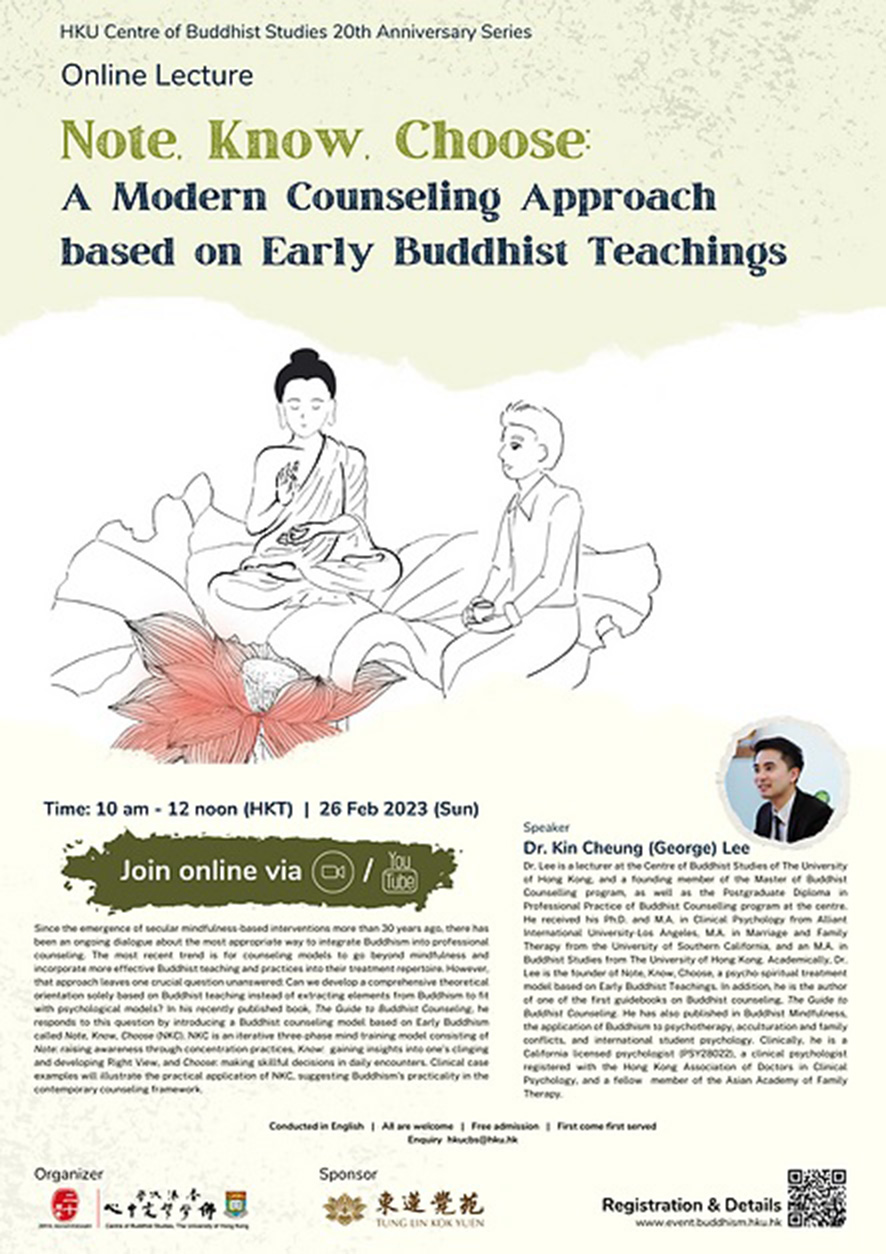HKU Centre of Buddhist Studies 20th Anniversary Series
Online Lecture
Note, Know, Choose:
A Modern Counseling Approach based on Early Buddhist Teachings
| Dummy | Dummy |
|---|---|
| Speaker | Dr. Kin Cheung (George) Lee |
| Time: | 10 am - 12 noon (HKT) | 26 Feb 2023 (Sun) |
| Language: | English |
| Type: | All are welcome | Free admission |
| Organized by: | HKU Centre of Buddhist Studies |
| Sponsored by: | Tung Lin Kok Yuen |
| Enquiry: | hkucbs@hku.hk |
Live Link:
About The Speaker:
 Dr. Kin Cheung (George) Lee
Dr. Kin Cheung (George) Lee
Dr. Kin Cheung (George) Lee is a lecturer at the Centre of Buddhist Studies of The University of Hong Kong, and a founding member of the Master of Buddhist Counselling program, as well as the Postgraduate Diploma in Professional Practice of Buddhist Counselling program at the centre. He received his Ph.D. and M.A. in Clinical Psychology from Alliant International University-Los Angeles, M.A. in Marriage and Family Therapy from the University of Southern California, and an M.A. in Buddhist Studies from The University of Hong Kong. Academically, Dr. Lee is the founder of Note, Know, Choose, a psycho-spiritual treatment model based on Early Buddhist Teachings. In addition, he is the author of one of the first guidebooks on Buddhist counseling, The Guide to Buddhist Counseling. He has also published in Buddhist Mindfulness, the application of Buddhism to psychotherapy, acculturation and family conflicts, and international student psychology. Clinically, he is a California licensed psychologist (PSY28022), a clinical psychologist registered with the Hong Kong Association of Doctors in Clinical Psychology, and a fellow member of the Asian Academy of Family Therapy.
Lecture Abstract:
Since the emergence of secular mindfulness-based interventions more than 30 years ago, there has been an ongoing dialogue about the most appropriate way to integrate Buddhism into professional counseling. The most recent trend is for counseling models to go beyond mindfulness and incorporate more effective Buddhist teaching and practices into their treatment repertoire. However, that approach leaves one crucial question unanswered: Can we develop a comprehensive theoretical orientation solely based on Buddhist teaching instead of extracting elements from Buddhism to fit with psychological models? In his recently published book, The Guide to Buddhist Counseling, he responds to this question by introducing a Buddhist counseling model based on Early Buddhism called Note, Know, Choose (NKC). NKC is an iterative three-phase mind training model consisting of Note: raising awareness through concentration practices, Know: gaining insights into one’s clinging and developing Right View, and Choose: making skillful decisions in daily encounters. Clinical case examples will illustrate the practical application of NKC, suggesting Buddhism’s practicality in the contemporary counseling framework.
